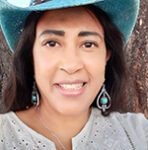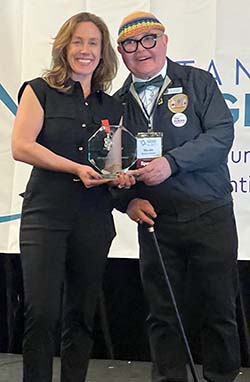By Barrett Holman Leak

SAN DIEGO — This time last year, we in the Jewish community were shocked and traumatized, just four months after the October 7 Massacre in Israel. This year, we are more steadily standing together among ourselves and with allies — and “stronger together” was the theme of this year’s American Jewish Committee gathering.
What spoke loudly throughout the February 2 event was the realization among the American Jewish community that standing strong in the fight against the pervasive antisemitism ravaging American society (including school and university campuses) means standing together with non-Jewish allies. The day’s symposium was filled with presentations and conversations about the impact of non-Jewish allies who have stood with American Jews and Israelis since Hamas attacked Israel nearly 500 days ago.
We opened with a strong message of support from San Diego Mayor Todd Gloria: “When it comes to fighting antisemitism, Jews can’t go it alone—nor should they, he said. “Antisemitism has never been just a Jewish problem,” Gloria said in a video address. “It’s one we must all solve. Because that’s what a community does.”
The symposium brought together a diverse array of Jewish and non-Jewish community members to hear informative panels and give opportunity to seek and learn the best ways to combat antisemitism and create greater understanding between Jews and other groups.
“The importance of combating antisemitism impacts us all,” said AJC San Diego Director Sara E. Brown. “Antisemitism is not just a threat against Jews. It is a threat against our democracy, our liberty, our values, our freedom. So, we must take a stand not just as a Jewish people, but as a human family.”
Brown was also in conversation with author and journalist Franklin Foer, whose 2024 article in The Atlantic, “The Golden Age of American Jews,” attracted widespread attention for its warning that antisemitism from both the right and the left threatens to upend the American Jewish experience.
Foer, who spoke at AJC’s Global Forum last year, said: “As Jews, as allies, I think we all need to work on this collective project of reinvigorating democracy and understand that antisemitism matters because it’s a bellwether for how conspiracy theories flourish in our country, how we are incapable of trusting one another, and how we struggle to have conversations about difficult things.”
With about 100,700 people, Jews make up roughly 3% of the greater population in the San Diego area. Although relatively small in number, the Jewish community is making its presence felt by fighting antisemitism and pushing back against blatantly anti-Zionist ethnic studies content in K–12 schools. It was also emphasized that the Jewish community wants to develop close partnerships with leaders from different faiths and ethnic groups who have also experienced prejudice.
“We may come from many different faiths and backgrounds but we have a lot in common, especially when it comes to recognizing the need to come together to stem the flow of hate,” said Jewish Federation of San Diego President and CEO Heidi Gantwerk.

Recognizing the importance of this allyship, Nicole Murray Ramirez, a Latino and longtime LGBT activist in San Diego, was recognized with an allyship award. He noted that when gay San Diegans frequently faced prejudice and violence—even after same-sex relationships were legalized in California in 1977—it was the Jewish community that was the first to stand with them.
The Jewish and African American communities have a history of allyship which brought many gains in the fight against racism and antisemitism and which now is slowly being revived. It is challenging in these times because affirmative action and DEI (diversity, equity and inclusion) – two different things – are being used to drive a deep wedge between the two communities.
I attended the breakout session titled “DEI: What We Got Wrong and How We can Make it Right.” One point raised in this session (led by Kiyomi Kowalski of Project Shema, Whitney Weathers, Managing Director of Upstart, and Nicole Nevarez, a local coach and wife of Congregation Beth Israel’s Rabbi Jason Nevarez.) was that African American Jews are not being invited to the table in DEI discussions in the Jewish community. It was also mentioned that “DEI” is being misused as a racist euphemism for Black people in our current national climate, positioning Jews and Blacks against one another. I spoke up about this and noted that the only people benefitting from that misuse of DEI and from keeping Jewish Americans and Black Americans apart is our common adversary – white nationalists/white supremacists.
We were just starting an engaging conversation clarifying diversity, equity and inclusion (for ethnicity/race, gender, disability etc) and how it could be improved through inclusion of Jewish people and come closer to what it was meant to be, when we had to switch to another session.
The second breakout session I attended was “In Our Town: Antisemitism and San Diego Jews” (facilitated by a panel comprised of Rabbi Yael Ridbergl Heidi Gantwerk the President of Jewish Federation of San Diego; and Darren Schwartz, Chief Planning and Strategy Office of Jewish Federation of San Diego). The panel gave us real-life examples of the antisemitic statements and actions that have dramatically increased in San Diego and which threaten the safety and security of the Jewish community.
Rabbi Ridberg revealed that along the way she came to approach interfaith interactions differently and she re-evaluated her priorities and will be retiring and spending more time with her husband and children. Rabbi Ridberg spent much time in Israel after the Hamas assault officiating funerals for those killed in the genocidal attack.
I wish we had an extra hour for the entire program with an additional 30 minutes allotted for each of the two breakout sessions for discussion. After the presentation by the panel, we needed more time to ask clarifying questions.
This year, the symposium added a component for Jewish high school teens, including a workshop for 50 students focused on maintaining a strong Jewish identity amid rising antisemitism and becoming effective advocates for the Jewish community.
Those advocacy skills are at the core of AJC’s Leaders for Tomorrow (LFT) program, which has trained nearly 2,000 high school students across the country on how to effectively speak up for Israel and the Jewish people.
“With a spike in anti-Zionist and antisemitic activity on campuses, Jewish students, more than ever, should have the tools and skills they need to stand up for the issues that matter to the Jewish community before they get to college,” said AJC Los Angeles Assistant Director Alissa Bernstein, who moderated the teen track.
The symposium was capped by an appearance from singer-songwriter John Ondrasik, who goes by the stage name Five For Fighting. Among the songs he played – to a standing ovation – was “OK (We Are Not OK),” a song he wrote about the Oct. 7, 2023, Hamas massacre, which he performed last April at Hostage Square in Tel Aviv.
Ondrasik’s presence was in many ways emblematic of what the symposium was all about. He is not Jewish. Ondrasik said that did not matter.
“One does not have to be Jewish to condemn the evil that is Hamas, one just has to be human,” he said.
*
Barrett Holman Leak is an author, educator, and community organizer.
I would like to subscribe for daily online delivery.
Hi Ruth, Go to sdjewishworld.com and scroll down to the bottom of the right hand column, where the sign up for subscriptions box is located. Then follow directions. Subscribers need to fill out the form personally. It is a three step process.
Thanks, Don